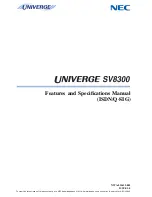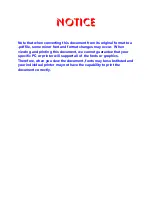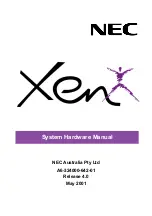
ENGLISH
4
1: A/B Receiver LEDs
- When signal is being
received, one of these will be lit orange, showing
you whether the (left) “A” or (right) “B” receiver
is currently being used. The UM1 constantly
scans its two antennas and automatically selects
whichever is receiving the strongest, clearest
signal. This
True Diversity
switching is complete-
ly inaudible, but it effectively increases overall
range while virtually eliminating potential inter-
ference and phase cancellation problems.
2: Meter
- This set of three multicolor LEDs acts
as a meter, indicating either battery power or
the strength of the incoming RF signal. This
meter can also be disabled altogether to con-
serve battery power. See #15 on the next page
for more information.
3: Peak LED
- This LED lights red when output
signal from the UM1 is at the onset of clipping
(that is, when it is on the verge of being dis-
torted). If you see this light during operation,
move the microphone further away or lower the
output level of your instrument or transmitter.
For more information, see the section entitled
“Setting Up and Using the UM1 System” on page
9 in this manual.
4: Power switch
- Use this to turn the UM1
power on and off.
5: SQ (Squelch) Level control
- This control
determines the maximum range of the UM1
before audio signal dropout. Although it can be
adjusted using the supplied plastic screwdriver,
it should normally be left at its factory setting.
See the “Setting Up and Using the UM1 System”
section on page 9 in this manual for more infor-
mation.
6: Battery holder
- Insert a standard 9-volt alka-
line battery here, being sure to observe the plus and minus polarity markings shown. We recom-
mend the Duracell MN 1604 type battery. Although rechargeable Ni-Cad batteries can be used,
they do not supply adequate current for more than four hours.
WARNING:
Do not insert the bat-
tery backwards; doing so can cause severe damage to the UM1 and will void your warranty.
7: Plastic screwdriver
- Specially designed for use in adjusting the UM1 Squelch Level control
(see #4 above). See the “Setting Up and Using the UM1 System” section on page 9 in this manual
for more information.
8: Antennas (A and B)
- The antenna mountings allow full rotation for optimum placement. In
normal operation, both antennas should be placed in a vertical position. Both antennas can be
folded inward for convenience when transporting the UM1. See the “Setting Up and Using the
UM1” section on page 9 in this manual for more information.
Guided Tour - UM1
SAMSON
SAMSON
MAX
MIN
POWER
ON
SQ LEVEL
UHF MICRO DIVERSITY RECEIVER
B
A
LOW
MID HIGH PEAK
800MHz
2
3
1
5
7
4
6
1
+
-
600HMz
Summary of Contents for CT7
Page 1: ...samsontech com MICRO DIVERSITY WIRELESS SYSTEM FOR VIDEO Owners Manual...
Page 7: ...5...
Page 17: ...15...
Page 37: ...35...
Page 46: ...Industry Canada...







































